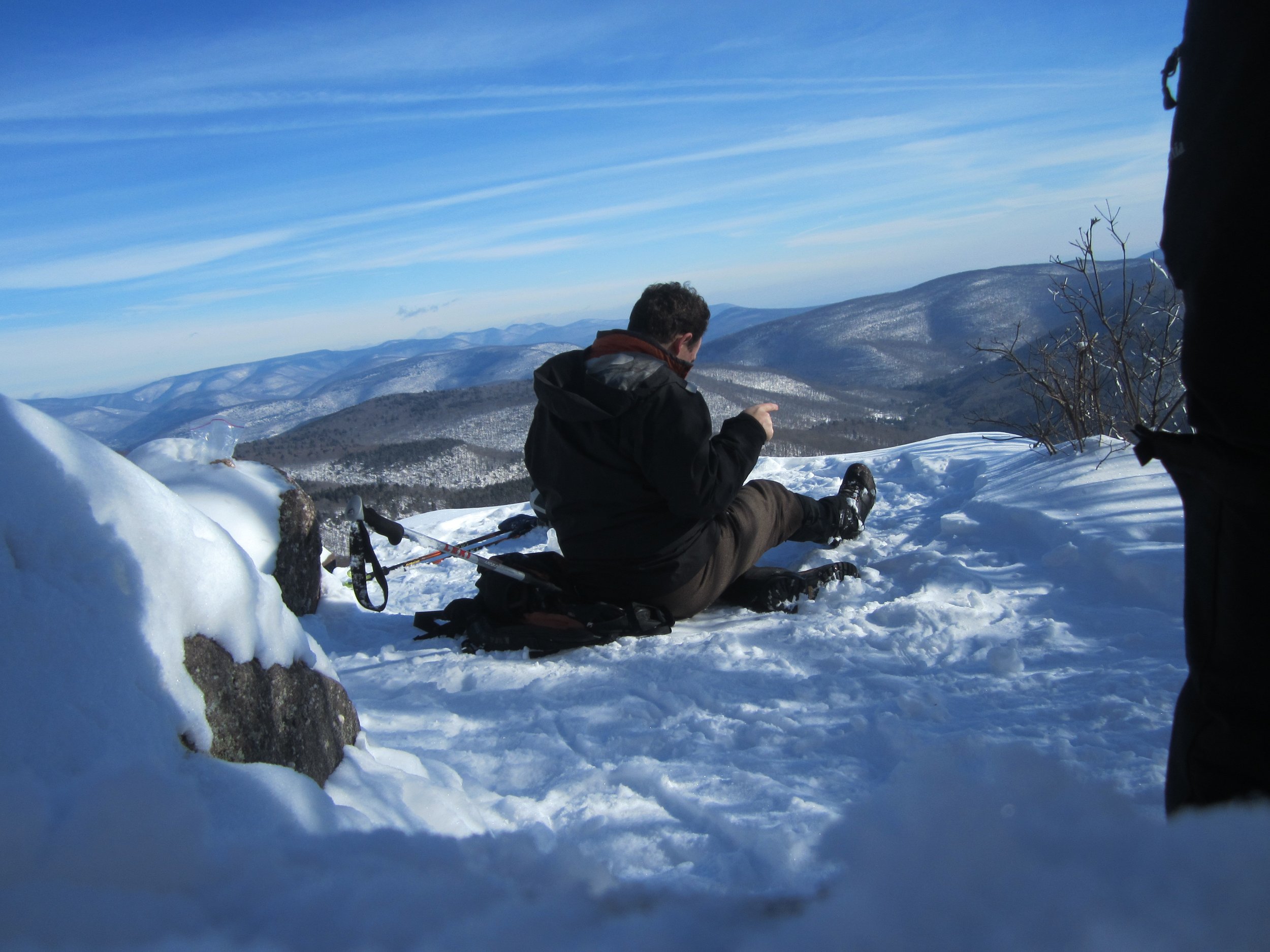River Time
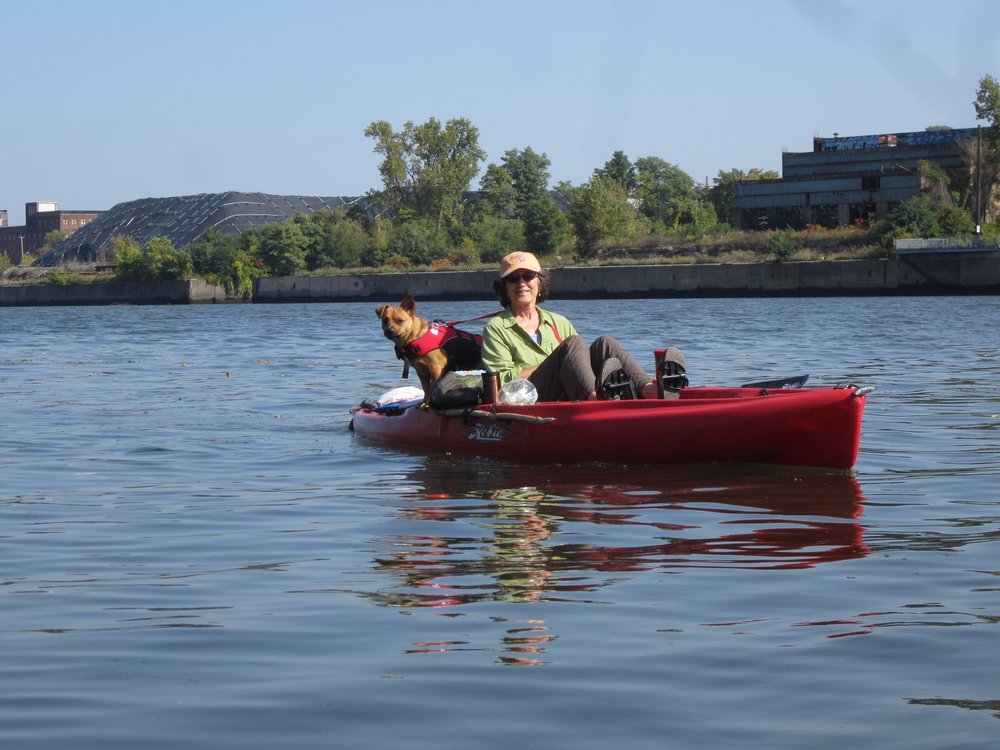
We included Merle, who at age 72 teaches Outward Bound courses, has a shock of curly gray-white hair and a calm steady demeanor; Kate on her pedal boat, after shoulder surgery, long legs shoving south; and me, on a short fall break from teaching, desperate not to think about faculty meetings. The most important team member, however, was Neena, a pint sized dog, which Kate had just rescued. This was Neena’s river baptism. To keep her happy--and who doesn't want to keep a dog happy--we stopped every hour to stretch and pee and marvel over how slowly we were moving.

We included Merle, who at age 72 teaches Outward Bound courses, has a shock of curly gray-white hair and a calm steady demeanor; Kate on her pedal boat, after shoulder surgery, long legs shoving south; and me, on a short fall break from teaching, desperate not to think about faculty meetings. The most important team member, however, was Neena, a pint sized dog, which Kate had just rescued. This was Neena’s river baptism. To keep her happy--and who doesn't want to keep a dog happy--we stopped every hour to stretch and pee and marvel over how slowly we were moving.
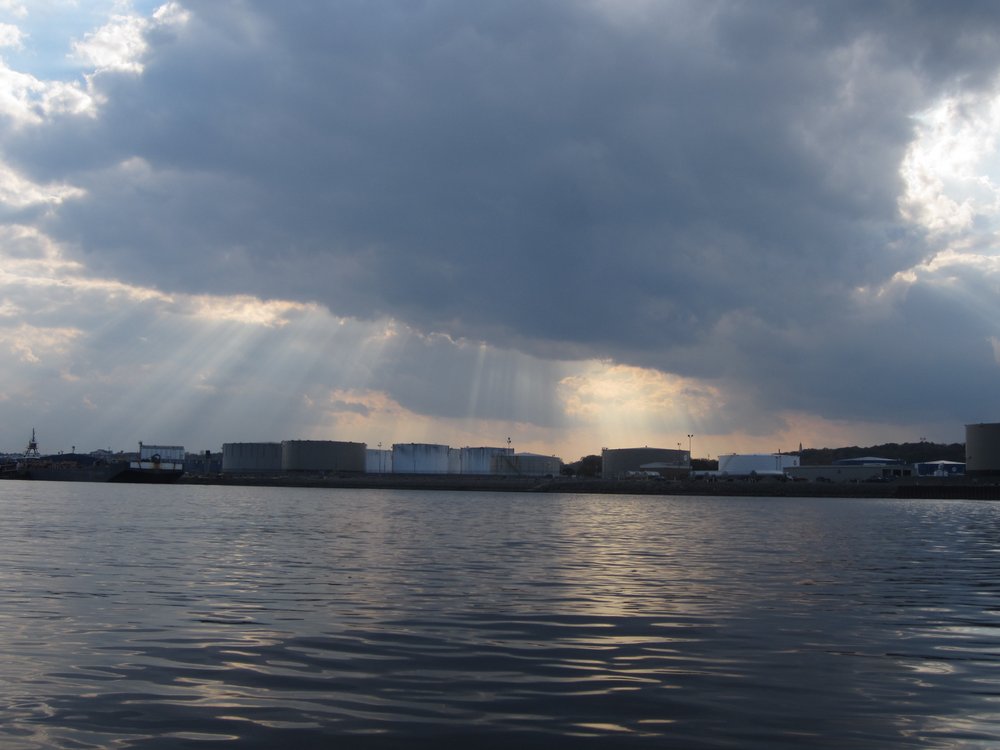
We needed a campsite in this unlovely place. Room for three tents, three boats, three tired women. Papscanee Island is not quite an island, and is rimmed with wooden pylons, visible at low tide, and beyond the pylons, rocks covered over with...asphalt. The asphalt was often cracked in a yawn to reveal a jumble of rock teeth. The Hudson River Watertrail guide states "There is no river access for boaters." But, we needed access into the trees. And that is what we found, directly across the narrow river from a set of oil tanks.
Once dark settled in, once we had eaten our magnificent burritos--all river food is delicious--we realized that the spot lights from the oil tanks were going to keep us company through the night. I had been yearning for the quiet that is sleeping with my back to the ground. But that is not what we had that night. At two in the morning a barge arrived, pushed by a roaring little tug. And they began to offload oil, using enormous diesel powered pumps. They were still pumping when we pulled our near sleepless bodies from our tents.
"That wins for the worst campsite of my life," I joked.
You would think at this point I would speak of grumpiness, of bad temper, or perhaps even the nuttiness of this adventure. Instead, I'm going to write of giddiness as we shoved south, of wonder as I counted the bald eagles that soared over us, or perched in a nearby tree, fishing for their next meal. By the end of the day I had counted twenty-two of the big birds, birds that but twenty years ago had all but vanished from the Hudson Valley. I allowed myself a drop of hope.
First the wind gusted from the south, making our passage a trial, then it shifted to the north, making it a joy. We scooted along, and by four in the afternoon, we pulled onto the sandy shore of Gays Point.
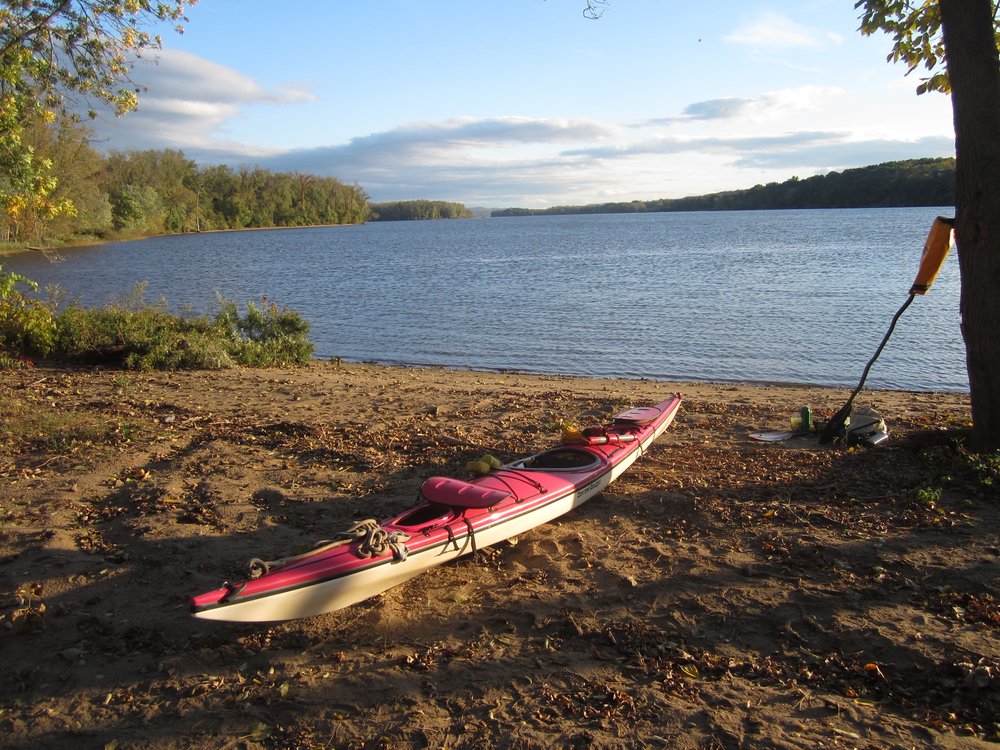
The smooth river pulled me early from my tent, to oatmeal and coffee. Before we slipped into our boats, we stood with our toes in the water and "clapped on" the river. Merle spoke of the beauty and necessity of this river, our time on it. It was but a drop of time, but at that moment I felt like we had been there for days, weeks, my body settled into its aches, my mind into the quiet thoughts that emerged from what I saw. Nothing more.
Then we pushed south, wondering where our adventure would end. As I approached Stockport Middle Grounds, the first flock of Brant coursed by over head. Six more flocks of the small dark geese flapped by, bringing news of the Arctic, and of colder weather, of winter.
I was now in familiar land, reaches I had paddled many times before: Middle Ground Flats, the quirky village of Athens, the Rip Van Winkle bridge. I knew the zig zag path of the channel in this section and how the eastern shore is shallow at low tide.
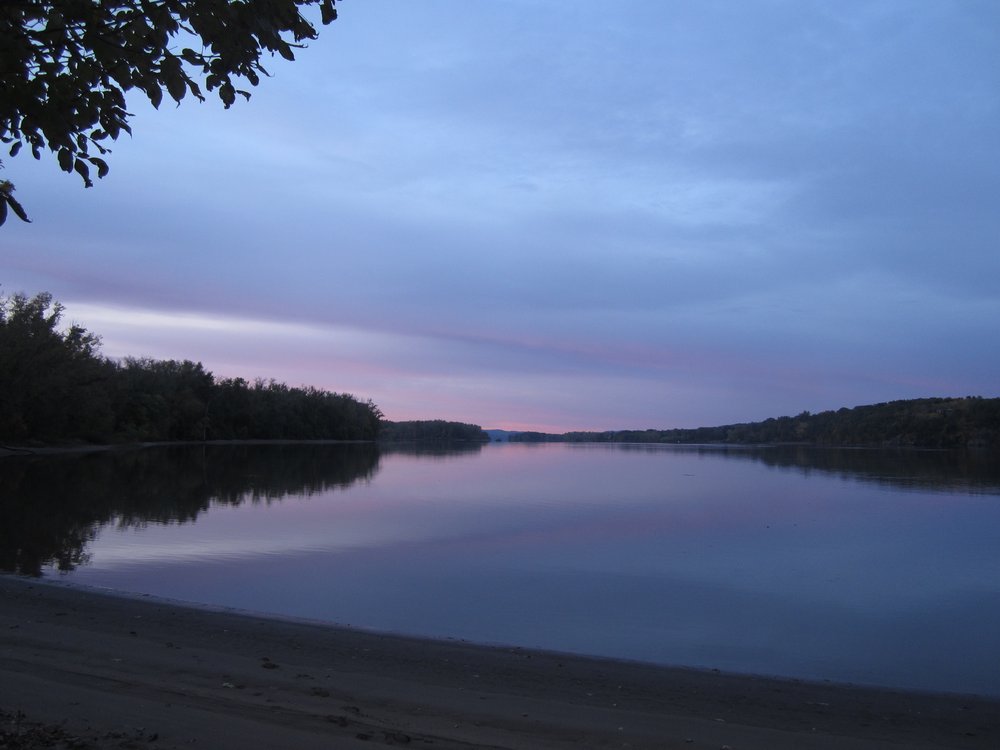
Merle, Kate and I stood with our toes in the water and "clapped off." Merle spoke with a clear wisdom, thanking the river for our time, the company, the adventures had and to come. I had tears in my eyes as we all clapped our goodbye to the river.
Squirrel Madness
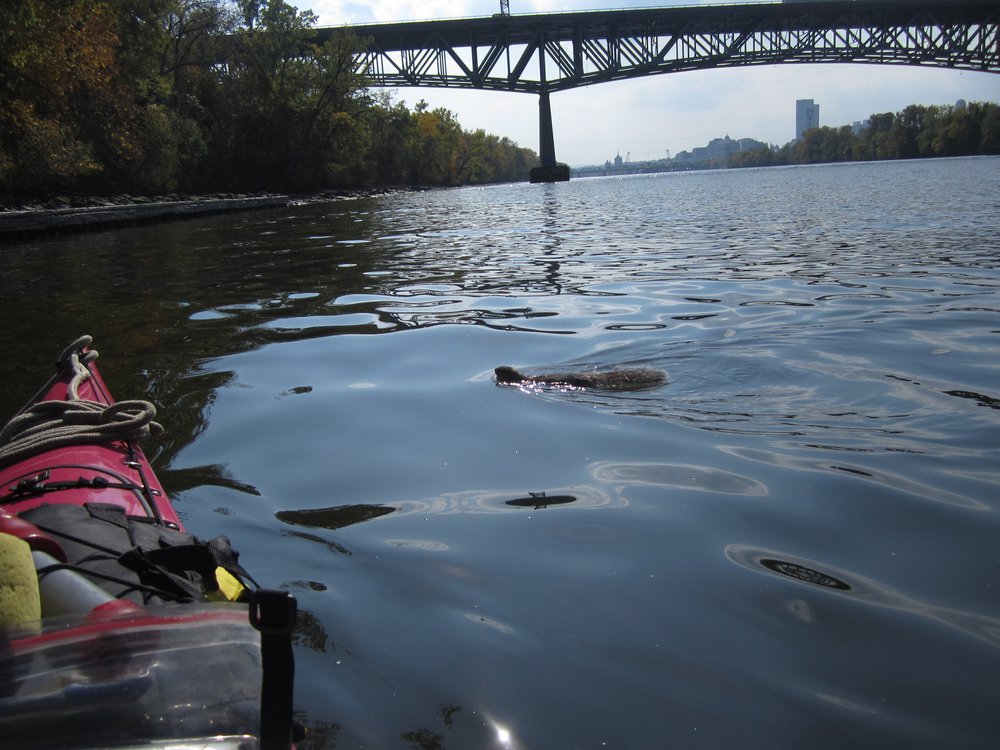
But there, near the bow of my boat, I spied something moving in the water. I usually see beaver or musk rat, sometimes I see snapping turtles, the V of their heads cutting the surface in the Tivoli Bay. This was not any of those familiar creatures. The animal had a fluffy gray tail that floated on the surface of the water, then a tiny head that was barely cutting the surface. A squirrel!

But there, near the bow of my boat, I spied something moving in the water. I usually see beaver or musk rat, sometimes I see snapping turtles, the V of their heads cutting the surface in the Tivoli Bay. This was not any of those familiar creatures. The animal had a fluffy gray tail that floated on the surface of the water, then a tiny head that was barely cutting the surface. A squirrel!

But here was a squirrel swimming the river, an athletic feat I had only seen once before. I steered toward the squirrel, then dropped my paddle and reached for my camera. As I started to point and shoot, I realized we were on a collision course. I tried to back stroke, but heard a small thunk. My heart sunk: I had just run over a squirrel, with my kayak. Then I saw the tiny paws reach up, grab one of the deck lines, and do a small pull up. Suddenly the soaked squirrel was perched on my sponge. We looked at each other. I apologized. I promised the squirrel I would take it to shore. The squirrel walked daintily to the end of my boat, and waited for safe passage. I slid onto shore and it sat there for a moment. Then it made the leap, and walked off to the woods.
Goodbyes
This is the week of goodbyes. Over the course of the next three days I will be saying goodbye to the seniors graduating from Bard College. Tomorrow marks the first goodbye, with the baccalaureat ceremony, followed by the always-rowdy senior dinner. Friday night at the President's dinner we say farewell in a more sedate manner. What follows the dinner is my favorite part of graduation, the senior concert. The American Symphony Orchestra performs pieces composed by graduating seniors. The music is always inspiring. To hear a work of a young composer performed by such a talented orchestra is thrilling. And then Saturday, those students march across a stage and are gone. So fast. I've watched some grow up, intellectually, emotionally, physically. The young men change more than the women, it seems, growing taller and broader in four years.
This is the week of goodbyes. Over the course of the next three days I will be saying goodbye to the seniors graduating from Bard College. Tomorrow marks the first goodbye, with the baccalaureat ceremony, followed by the always-rowdy senior dinner. Friday night at the President's dinner we say farewell in a more sedate manner. What follows the dinner is my favorite part of graduation, the senior concert. The American Symphony Orchestra performs pieces composed by graduating seniors. The music is always inspiring. To hear a work of a young composer performed by such a talented orchestra is thrilling. And then Saturday, those students march across a stage and are gone. So fast. I've watched some grow up, intellectually, emotionally, physically. The young men change more than the women, it seems, growing taller and broader in four years.
I am always a bit heartbroken at the end of graduation. On that day, a shift happens. These graduates no longer need me--to read their work, encourage them through finals, figure out a paper topic. I applaud this, of course. But it leaves a hole. And then I will wait for the next shift, that moment when they write needing a letter of recommendation for graduate school. They write to tell me of jobs or marriages, of children born. They write to tell me they are writing.
To add to the leavings, I too am leaving, off to Alaska for a month. My own departure for such a stretch of time has its own sense of loss. Of course I'm thrilled to be off to this big place I have visited before. I have never been disappointed with my adventures in Alaska. But for a stretch of a month, I will be off the river. This has created in me a sense of quiet desperation. I've been out in my boat as much as I can, as if I can absorb the river into my body and take it with me.
I've come to need the river, and the egotistical side of this is that I sense the river needs me as well. It doesn't, of course. Recently I received an email from Riverkeeper in which they describe their captain, who is also my good friend, John Lipscomb, as the eyes and ears of the river. He keeps a watch on the river, reporting back what he finds, taking action against polluters and illegal developers. But I really see him as the voice of the river, speaking for what the river needs. The river does need him. Perhaps the river does need all of us.
This morning, under a half-blue sky, I shoved north from the Tivoli launch, headed toward the Saugerties Lighthouse. I dipped into the bay south of the lighthouse, the same bay that will be clogged with water chestnut and spatterdock by the time I return from Alaska. I was about twenty feet away from shoreline when I spotted the eagle, perched low in a snag. It sat there as I bobbed in the water; it preened, and ignored me. Of all the birds on the river, this is the one that people are most excited to see. "See any eagles?" is the first question I get when people see my binoculars. What most people don't understand is that the eagle is an obvious bird; birders are looking for smaller, more elusive birds. And yet--seeing an eagle, especially so close, remains a remarkable thing. I thought of all of the eagles I will see in Alaska. My memory is that they are everywhere, so common you stop paying attention to them. I'll hold onto this image of my Hudson River eagle, part of the success of restoring this river. Restored because people need this river but the river needs us as well to care for the shad and sturgeon, the eels and eagles.
Perfect Timing

Garbage CrewIt takes a while before we start to see the garbage. A bottle here or there rests at the edges of the still-brown cattails and phragmites that line the waterway that meanders through the North Tivoli Bay. When I pull the canoe up onto the mucky embankment Susan Lyne gets out and from her standing perspective locates a half dozen more items that don’t belong, items made of plastic or Styrofoam,glass, metal. She scoops them up, along with a plastic turkey, and we jam everything into two bags, one in front of her son, Emmet, the other behind him. Emmet is our youngest garbage collector and while he showed a real talent on land, grabbing things with the garbage picker, he’s less excited about being in the canoe. “It’s dirty,” he explains.
Susan with treasures from the Bay
It’s hard to find a kid—a boy—who doesn’t like mud. But he’s right. The mud is dirty. Besides the fact that it is gooey and brown it smells slightly, that fermented pond smell that makes me so happy. But who knows what else is laced into that mud? If I thought too much about that, I wouldn’t get out of my boat. So the truth is, I’m happy Emmet is a young neat-freak and keeping his hands and feet inside of the wide metal canoe.
The sun beats down on us as we gather more things. We watch as Sheri takes on an enormous plastic tarp and drags it behind her kayak. Emily has a bag stuffed into the cockpit of her kayak. The Bland family—Avis, Celia and Alex—have scooped up a refrigerator. It’s hard to tell who has the best booty.

We are all cruising the North Bay on a Saturday late morning in search of garbage. It’s a great treasure hunt And the more we find, the more we find. It works like that. Our eyes adjust so that a glint is a bottle, a bump the edge of a barrel. There’s a general sense of excitement and an extreme sense that we are doing good work. Knowing that in the South Tivoli Bay, a group of Bard College students are cruising those waters Bard College students, gleefulcollecting their own garbage adds to the collective sense of purpose. And in a few weeks, with Riverkeeper's River Sweep, groups the length of the river will clean up. We will make this Hudson River cleaner. One small thing in a world that needs lots of small things.
Soon enough, Emmet doesn’t want to be on the water any longer. I’m impressed he made it as far as he did, but I’m sorry to lose my canoe partners. Just then, my phone rings and my friend Georganna calls to say she’s a half hour away. Perfect timing.
I drop off one set of partners and all of our loot and scoop up the next. That George is still fresh helps to give me some energy. We work our way around the circuitous water paths of the north bay, until we reach the wide bay by the railroad underpass. Everyone seems to have vanished, though I know Emily and Sheri are out here somewhere. We poke along, past the docks that washed into the bay after Hurricane Irene. Then we meander down one of the alleyways that run parallel to the train tracks.
I glance over my shoulder and see a plant I have never seen before. “What’s that?” George asks as I’m about to exclaim, “Golden Club.”
Golden clubThough I’ve never seen this plant before it is so distinct I know right away what it is. Brilliant yellow prongs, like a riding crop, emerge from green leaves. It’s a plant I have been looking forfor years.
I first read about Golden Club in Ester Kiviat’s book about the Tivoli Bays. She goes in search of this rare flower, with no luck. Her quest sent me on my own searches and every year I have come up empty.
What surprises me is how beautiful the yellows are in this flower. Practically neon in their brightness. I jump out of the canoe to take photographs of the flower. I’m dizzy with excitement. A golden club at last. And what are the chances? It’s a flower that blooms but a week every year—usually in May. Here it is, early in the season, and without searching, I found it. Perfect timing.
Georganna with a canoe-load of garbage
Before I get back in the boat, I pick up a hunk of Styrofoam and a can of soda, dented and filled with mud.



